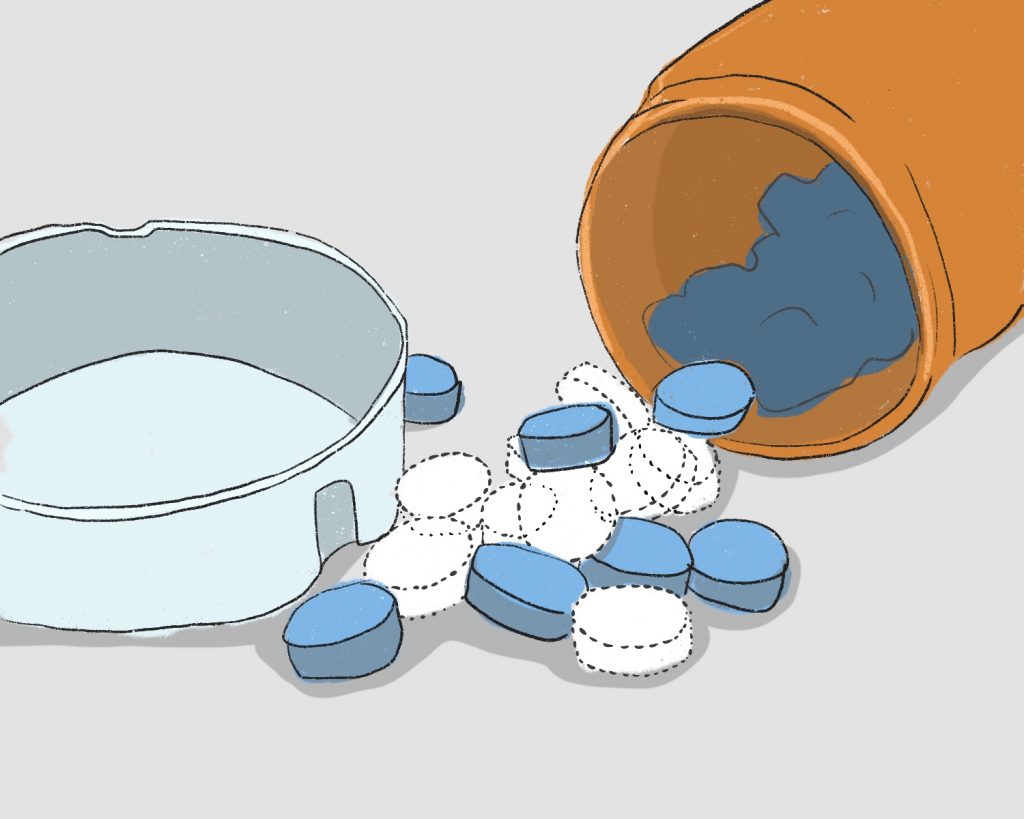Stimulant medication shortages have impacted many across the United States seeking treatment for attention-deficit hyperactivity disorder (ADHD).
The national shortage of amphetamine mixed salts, sold under the brand name Adderall — one of the most commonly prescribed medications to treat ADHD — was first recognized by the Food and Drug Administration in October 2022. Other stimulants have also been undersupplied, including Concerta, Vyvanse and their generic counterparts. The shortage has impacted mental health providers, both across the country and locally, including Psychiatry Services at Decker Student Health Services Center. Students may have to find alternatives for prescribed medication — or seek new medication entirely.
“In cases where a student cannot get an ADHD medication prescription filled that we have written, we work with them to find pharmacies that may have supplies in stock for their medication or generic or brand-name alternatives,” Ramona Mazzeo, the clinical director of psychiatry services at the Decker Student Health Services Center, wrote in an email. “Sometimes, that means some work in choosing pharmacies in other towns or switching to other forms of stimulant medication that may not be popularly prescribed.”
For students seeking an ADHD diagnosis, Decker Psychiatry Services requires they get tested by an off-campus provider to ensure that they distinguish between ADHD and other psychiatric conditions that may exhibit similar symptoms. Highlighting concerns about overprescribing stimulant medication, Mazzeo emphasized that Decker Psychiatry Services rarely prescribes stimulants. Students previously diagnosed with ADHD that cannot access treatment with their home providers or other off-campus options can be considered for initial treatment while they look toward longer-term care solutions but must be reviewed and receive drug tests, evaluations and frequent check-ins.
Overprescription of ADHD medication has long been a concern for clinicians, with some describing it as a cause of the current stimulant shortage. The number of prescriptions for ADHD medications has increased, with prescriptions for stimulants rising 14 percent between 2020 and 2022. ADHD diagnoses have also risen, with a major health care records company reporting that 0.6 percent of patients have an ADHD diagnosis in 2022 versus about 0.4 percent in 2019.
Stimulants are classified by the Drug Enforcement Agency (DEA) as Schedule II drugs, meaning that they have a high potential for dependency, abuse and dangerous side effects. College students often abuse Adderall and other central nervous system stimulants to increase focus and attention span. According to a 2018 study by the National Library of Medicine, around 20 percent of college students are likely misusing prescription stimulants. Mazzeo explained that stimulant abuse combined with overprescription has contributed to the shortage and made ADHD treatment less accessible.
“[The shortages are] why the accurate and thorough diagnosis of ADHD should be required before any controlled substance is prescribed to get the medication to the patients who need it and control the distribution of prescription medication,” Mazzeo wrote. “This is not unlike the opiate crisis, [where] medications that were meant for serious and severe symptoms of pain were overprescribed for common pain, causing an increase in supply in the community and increased risk for abuse of medication and its consequences on the individual and the health care system.”
Supply chain and manufacturing issues are other factors contributing to the shortage. Drug manufacturers say that yearly quotas set by the DEA, which limit the amount of stimulant medication that can be produced, prevent them from boosting supply to address the shortage. The agency, in turn, has previously blamed drug manufacturers for not meeting these goals and producing less medication than legally allowed.
While the shortage has impacted stimulant prescriptions, other resources are still available for students seeking ADHD treatment. Other, non-stimulant medications to treat ADHD — like bupropion an antidepressant sold under the brand name Wellbutrin — have not been impacted by the shortage. The health and counseling case manager, a new position at Decker Psychiatry Services, is designed to work with students to coordinate treatment options for conditions like ADHD. The case manager also assists in teaching students skills to access and navigate the health care system.
Students may also meet with the University Counseling Center (UCC) or Services for Students with Disabilities (SSD), which can assist with providing accommodations such as extended testing time. Brian Flynn, the vice president of the neurodiversity club and a first-year graduate student studying biomedical engineering, said these resources can often be hard to find due to confusing website navigation, lack of awareness and inaccessibility.
“While it’s understandable to conserve resources for students who may not need such support — the SSD office, for example, has had only five employees since its inception in the 80s and only recently expanded to seven — it’s a slap in the face for the majority of students who still need them, as 90 percent of individuals diagnosed with ADHD still express symptoms as adults and did not ‘grow out of it,’” Flynn wrote.



